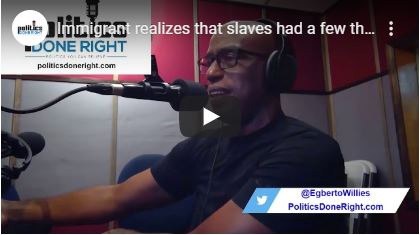A caller to Politics Done Right, Syed made a prescient observation about America, slavery, and healthcare that I was compelled to address. He noted that in studying American history, he realized that slave owners had to ensure the health of their slaves while corporations don’t,
Sadly, based on the data, because slaves were the properties of the slavemasters, they ensured they had healthcare. After all, a dead slave is not only a loss generator of income but a loss of one’s capital.
In an economic system that values capital over humanity, an uninsured minimum wage worker or inexpensive worker is more valuable economically than a slave as they are expendable when ill and does not create a capital loss when dead.
Slaves had it, you don’t.
I think it is clear that our corporate state does not give up on anything until it is clear that what comes next offer equal or more value, an employee is less expensive than slaves, maybe?
I found the following text at a Stanford University site that should give one pause.
For example, the economic interests of slave owners during the antebellum period of slavery in America made the situation of elderly disabled slaves especially tenuous. Genovese (1974) made the following observation about the economic and work-related determinants of the life chances of pre-Civil War elderly slaves:
The Whites of Maryland expressed outrage at the extent to which slave holders were emancipating their old slaves in order to escape responsibility for them.
In Baltimore, as in other southern cities, incensed residents protested against the influx of Manumitted country Blacks who could only become a public charge, and fought for tough laws to curb the practice. No less staunch a pro-slavery writer than Dr. Josiah Mott of Mobile revealed the fragility of paternalistic concerns in his attack on the practice of insuring slaves.
As long as the Negro is sound, and worth more than the amount insured, self-interest will prompt the owner to preserve the life of the slave; but, if the slave became unsound and there is little prospect of perfect recovery, the underwriters cannot expect fair play—the insurance money is worth more than a slave, and the latter is regarded rather in the light of a super-annuated horse (Genovese, 1974, p. 520).
Understanding the above philosophy makes the capital tenet immediately visible.

